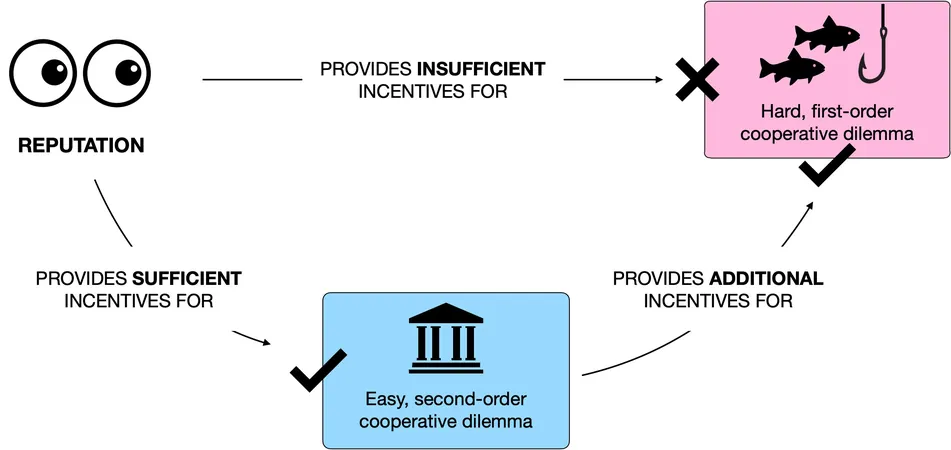
Unraveling the Secret: How Institutions Transform Weak Reputation Incentives into Strong Drivers of Cooperation!
2024-12-16
Author: Nur
Introduction
Institutions are the essential frameworks that hold human societies together, serving as the foundation for cooperation by rewarding altruistic behavior while punishing selfish actions. Yet, this pivotal role comes with a significant challenge: institutions, meant to incentivize cooperation, rely entirely on the cooperation of their members to function effectively.
The Study
A groundbreaking study published in the Proceedings of the National Academy of Sciences shines a light on how institutions not only emerge but flourish through the power of reputation. Conducted by researchers from the esteemed Max Planck Institute for Evolutionary Biology, the Institute for Advanced Studies in Toulouse (IAST), and the Institut Jean Nicod at ENS-PSL, this study reveals a sophisticated mathematical model that highlights this transformative process.
Cooperation Dilemmas
The research explores two closely linked cooperation dilemmas. The first is fraught with high costs or minimal monitoring, where reputation alone fails to ensure cooperative behavior. The second dilemma allows individuals to band together to alter the parameters of the first dilemma, creating a pathway for enhanced cooperation.
Leveraging Reputation
Remarkably, the findings indicate that this nested structure produces a leverage effect: while reputation may not resolve the first dilemma directly, it incentivizes individuals to contribute towards collective action aimed at tackling the second dilemma. This collective effort subsequently creates new motivations for cooperation in the more challenging first dilemma.
Historical Example: Tokugawa-era Japan
To illustrate these concepts, the study references a historical example from Tokugawa-era Japan, where village communities struggled with the sustainable management of shared forest resources, including firewood and building materials. This situation exemplified the "tragedy of the commons," where individual incentives clashed with collective needs, leading to potential overexploitation of resources.
Innovation in Monitoring
In response, communities devised an innovative solution: establishing the role of "detectives" to monitor forest use and enforce penalties on violators. This institution leveraged the desire for a good reputation to foster compliance, creating strong incentives for individuals to adhere to communal rules.
Accountability Mechanisms
An additional layer of complexity arose, as the institution itself required oversight to prevent corruption. Fortunately, monitoring these detectives proved more straightforward than tracking individual forest usage. A damaged reputation could jeopardize a detective's job and social standing, keeping them accountable. Through this mechanism, the community successfully navigated the complexities of forest management.
The Role of Institutions
The study ultimately posits that institutions serve as vital social technologies that capitalize on universal human motives, such as the pursuit of a favorable reputation. Much like a pulley that amplifies a small force to lift significant weight, institutions wield the power to transform weak reputation incentives into robust cooperation drivers. Evolving over time, these institutions have been honed to optimize social leverage, equipping societies to confront increasingly intricate cooperation challenges.
Conclusion
In conclusion, the insight into how institutions function reveals not just their significance in societal dynamics but also their incredible potential to inspire cooperation in even the most challenging circumstances. This enduring transformation underlines the critical role institutions play in fostering societal well-being and addressing collective challenges globally.


 Brasil (PT)
Brasil (PT)
 Canada (EN)
Canada (EN)
 Chile (ES)
Chile (ES)
 España (ES)
España (ES)
 France (FR)
France (FR)
 Hong Kong (EN)
Hong Kong (EN)
 Italia (IT)
Italia (IT)
 日本 (JA)
日本 (JA)
 Magyarország (HU)
Magyarország (HU)
 Norge (NO)
Norge (NO)
 Polska (PL)
Polska (PL)
 Schweiz (DE)
Schweiz (DE)
 Singapore (EN)
Singapore (EN)
 Sverige (SV)
Sverige (SV)
 Suomi (FI)
Suomi (FI)
 Türkiye (TR)
Türkiye (TR)